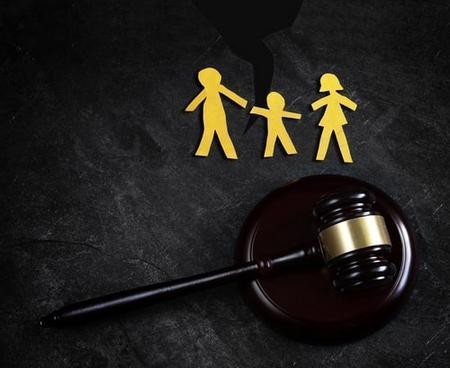Recent Blog Posts
UPDATE: Can I Sign Away My Parental Rights to an Unborn Child?

Originally published: May 16, 2016 -- Updated: August 12, 2021
UPDATE: It is important for fathers to understand that attempting to avoid responsibility for a child by refusing to sign the birth certificate or acknowledge fatherhood is usually not a good strategy. Even if a person did not want to have a child and does not want to be involved in the child’s life, they may still bear some responsibility for ensuring that the child’s needs will be met.
While a father may choose not to voluntarily acknowledge paternity, the child’s mother or other parties, such as a child support agency, may take legal action to establish paternity for the child. In these cases, a court will usually order DNA testing to be performed, and if a test shows that a man is the child’s biological father, he will be recognized as the legal father. Even if a father will not be sharing in parental responsibilities or spending any parenting time with the child, he will most likely still be required to pay ongoing child support. Typically, a father’s responsibilities toward a child will only be terminated if the child is adopted by another party, such as a step-parent or a relative. In these cases, the father may voluntarily relinquish parental rights and responsibilities, and the adoptive parent will be named the child’s legal parent.
5 Types of Valuable Assets to Address in a High Net Worth Divorce
 Whenever a couple chooses to end their marriage, they will need to address multiple legal and financial issues. High net worth divorce cases can be very complex, especially when it comes to the division of marital property. These couples will likely own multiple types of high-value assets, and as they determine how to divide these assets fairly, they will also need to understand the financial implications of the decisions they make.
Whenever a couple chooses to end their marriage, they will need to address multiple legal and financial issues. High net worth divorce cases can be very complex, especially when it comes to the division of marital property. These couples will likely own multiple types of high-value assets, and as they determine how to divide these assets fairly, they will also need to understand the financial implications of the decisions they make.
Dividing High-Value Assets
During a high net worth divorce, couples will need to gain a full understanding of all of the assets they own, including marital assets acquired during their marriage and separate property each spouse owned before getting married. Assets that these couples need to address may include:
-
Jewelry, artwork, and collectibles - Certain items owned by a couple may have both financial and sentimental value. In many cases, appraisals may need to be performed to determine the value of these items and ensure that they can be divided fairly.
Do I Have to File a Child Support Case in Court?
 Although the most commonly known method of collecting child support is through a court order as part of the Illinois divorce process, there are actually two ways of petitioning to collect child support. The first, as previously mentioned, is through an Illinois court. The second is by filing with the Illinois Division of Child Support Services (DCSS).
Although the most commonly known method of collecting child support is through a court order as part of the Illinois divorce process, there are actually two ways of petitioning to collect child support. The first, as previously mentioned, is through an Illinois court. The second is by filing with the Illinois Division of Child Support Services (DCSS).
If you are a parent of a child and you are attempting to collect child support, read on to learn more about the advantages and disadvantages of using DCSS to assist you, as well as how hiring a skilled child support attorney can help.
How Can DCSS Help Me Collect Child Support?
One major advantage of DCSS is that its services are free. These services include, but are not limited to:
-
Establishing paternity in order to determine who is responsible for paying child support
What Happens to Debt in an Illinois Divorce?
 So much of the conversation when we talk about divorce centers around the allocation of assets–property, money, investments. But a couple’s allocation of debt is often just as important, especially in an age where so many people carry the burden of enormous student loans.
So much of the conversation when we talk about divorce centers around the allocation of assets–property, money, investments. But a couple’s allocation of debt is often just as important, especially in an age where so many people carry the burden of enormous student loans.
Here, we will discuss different types of debt, the factors that can affect debt division, and the process by which debt is divided in an Illinois divorce.
Types of Debt
Marital assets and debts follow a similar pattern in a divorce. Debt that was owned by spouses prior to the marriage will generally be owned by that same spouse after a divorce. Debt that was taken on during the marriage is generally considered marital debt and will be divided between the spouses.
This is especially true when the debt is held under the name of both spouses, such as mortgages and home equity loans. Credit card debt can also be considered marital debt when it was taken out by only one spouse during the marriage if it was spent on items jointly used by the couple. For example, if a spouse used a credit card in their name alone to buy groceries for the entire family, the court may rule that both spouses are responsible for paying off that debt.
What if I Do Not Want Custody of My Child?
 Although some parents will act aggressively to get full parental responsibilities for their children, others feel differently. You may not want full or even partial custody of your child for a number of reasons. Your job, your children from a previous relationship, your desire for privacy, or your feelings that you are not equipped to provide the care your child needs are all possible reasons for wanting your child’s other parent to have the majority of the childcare responsibilities.
Although some parents will act aggressively to get full parental responsibilities for their children, others feel differently. You may not want full or even partial custody of your child for a number of reasons. Your job, your children from a previous relationship, your desire for privacy, or your feelings that you are not equipped to provide the care your child needs are all possible reasons for wanting your child’s other parent to have the majority of the childcare responsibilities.
What is Best for the Child?
Whether during divorce proceedings or when establishing parental responsibilities between unmarried parents, the court will make decisions according to what is in the best interests of the child. The court also takes the preferences of the parents and the child into account. If you do not want custody of your child at all, the court will most likely award full custody to the child’s other parent.
What Kinds of Property are Divided in an Illinois Divorce?
 Everyone knows that when a couple divorces, they split everything they own 50/50. Right? Wrong! Property division in divorce is actually much more complex than just throwing everything into a big pot and then splitting it down the middle.
Everyone knows that when a couple divorces, they split everything they own 50/50. Right? Wrong! Property division in divorce is actually much more complex than just throwing everything into a big pot and then splitting it down the middle.
In this blog, we will address some of the most common types of property that must be divided in a divorce, and how Illinois divorce courts tend to divide property. Keep in mind that Illinois is an “equitable distribution” state, meaning that rather than dividing assets 50/50, assets will be divided fairly according to a number of factors that the court will consider.
Homes and Land
The marital home is often the most valuable asset a couple owns together. Depending on whether the couple has children and one of the spouses wishes to stay in the home, the couple may choose to have one spouse buy out the other spouse’s value in the home, or sell the home and split the proceeds.
Can I Use Character Witnesses in My Illinois Divorce?
 In a high-conflict divorce where you and your spouse are unable to agree on anything, much less who should have custody or parental responsibilities for your child, character witnesses can be a valuable advantage to help you prove that living with you is in your child’s best interests. Here, we will explore the kinds of character witnesses you might use, as well as what a witness does and what you should do if a witness is reluctant to testify.
In a high-conflict divorce where you and your spouse are unable to agree on anything, much less who should have custody or parental responsibilities for your child, character witnesses can be a valuable advantage to help you prove that living with you is in your child’s best interests. Here, we will explore the kinds of character witnesses you might use, as well as what a witness does and what you should do if a witness is reluctant to testify.
Types of Witnesses
There are essentially three types of witnesses that might appear in divorce proceedings. An independent expert witness, such as a court-appointed psychologist, testifies about a specific topic but does not work for either spouse. A controlled expert witness likewise testifies about a specific topic, but is retained or paid for by one of the parties.
A lay witness–the most common type of character witness–is not an expert, and ideally is someone who is not biased in your favor. This could be a teacher, a babysitter, a neighbor, or anyone else who has seen interactions between you, your spouse, and your children. A character witness can testify regarding your favorable parenting abilities, or regarding your spouse’s unfavorable abilities. Family members may be seen as biased in your favor, so getting a variety of character witnesses may be more beneficial in supporting your case.
Can My Ex Move Out of State with Our Child?
 If you share a child with your ex, and they are considering moving out of Illinois, you may feel nervous about what this means for the future of your relationship with your child. Fortunately, the Illinois Marriage and Dissolution of Marriage Act includes provisions limiting how far custodial parents can move with their children without court approval.
If you share a child with your ex, and they are considering moving out of Illinois, you may feel nervous about what this means for the future of your relationship with your child. Fortunately, the Illinois Marriage and Dissolution of Marriage Act includes provisions limiting how far custodial parents can move with their children without court approval.
When is a Parent in Illinois Allowed to Move with a Child?
If your ex has custodial rights or parental responsibilities for at least half of the time, they are able to ask permission from the court to move and take the child with them.
A parent who lives in Cook, DuPage, Lake, Kane, McHenry, or Will County can move with a child within Illinois up to 25 miles away from where they lived previously, without receiving court approval. A parent who lives in any other county may move up to 50 miles away. Likewise, a parent who lives near the Illinois border with any other state may move into a different state as long as they remain within 25 miles of their previous location.
4 Tips For Self-Care During Your Illinois Divorce
 Divorce is stressful. This is such a truism it hardly needs to be said. Between splitting up assets, negotiating with your former partner, taking care of any children, and trying to keep a household and career running smoothly, self-care can fall by the wayside.
Divorce is stressful. This is such a truism it hardly needs to be said. Between splitting up assets, negotiating with your former partner, taking care of any children, and trying to keep a household and career running smoothly, self-care can fall by the wayside.
Ongoing stress is terrible for our mental and physical health, and people will often suffer from illness or chronic pain after a divorce. Anxiety and depression are also common, as is weight gain or loss, substance abuse, and even heart disease. Here are a few things you can do to help improve your health and reduce stress during a divorce.
Exercise
The benefits of exercise extend beyond physical health. Mental health also improves due to better digestion, heart rate, and hormone regulation. You will feel better all around if you can remember to stay active during your divorce–even if you are exhausted.
Get Enough Sleep
Lack of sleep and overwhelming stress can create a devastating one-two punch on your health. A full 7 to 8 hours of sleep is important, especially when your mind and body are trying to recover from stress. Try to create a daily routine for you and your family, and then stick to it. Schedule sleep and treat it like you would an important work appointment–do not miss it or let scheduling conflicts get in the way.
Is an Inheritance Considered Marital Property in an Illinois Divorce?
 When two people are married, most of the assets they acquire throughout the course of their marriage are considered marital property. During a divorce, a court will determine whether certain assets are considered marital or non-marital.
When two people are married, most of the assets they acquire throughout the course of their marriage are considered marital property. During a divorce, a court will determine whether certain assets are considered marital or non-marital.
If an asset is determined not to be marital property, the court has no legal authority to award part of the asset to the non-owner spouse in a divorce. Generally, assets acquired by inheritance, gift, legacy, or descent are not considered marital property in Illinois, but the way an asset is treated after the inheritance may render it marital property.
What is an Inheritance?
Inheritances are monies, properties, or other assets that are given to someone through an estate planning document, like a will, or through intestate succession. If someone inherits an asset while they are married, it is generally considered non-marital property, as long as it is possible to prove that the asset was specifically given to the recipient by the deceased.











